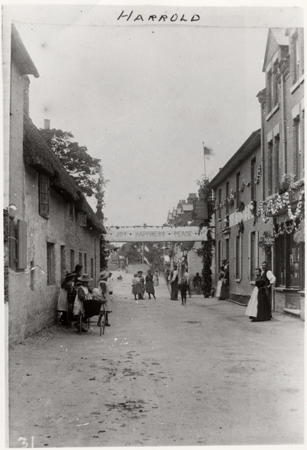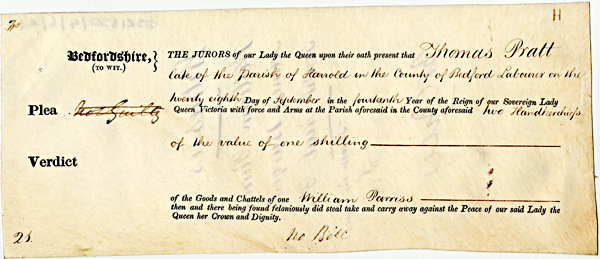Harrold Odell 2 Wheatsheaf
The Wheatsheaf, Harrold

An Opportunist and a Conman
The Wheatsheaf in Harrold was the site of at least two crimes. On 28 September 1850 William Parris went to the Wheatsheaf with a packet of five handkerchiefs and took out three to sell. While he sold one of them the other two, which had been left hanging on the back of a chair, disappeared. Parris had seen a man named Thomas Pratt touching them, and when he asked if anyone had the handkerchiefs Pratt left the room. When asked what he had under his coat Pratt swore and asked what it mattered to the questioner. James Burgess saw Pratt leave and was also sworn at. He then saw Pratt go into the wood barn; on his return Pratt offered to "treat" Burgess if he would go in with him. Burgess refused and when people came out of the pub asking about the handkerchiefs he told them what he had seen. The searchers took a light to the barn and found the missing items there. Pratt was arrested on charges of theft and being disorderly, but the case was dismissed at the Quarter Sessions.

These days handkerchiefs are an insignificant and largely obsolete item. In the Victorian era they were both ubiquitous and useful. They could be pocket handkerchiefs or neck handkerchiefs, and they were often used to wrap or carry items. A farm labourer's lunch might be left by the side of a field wrapped in a handkerchief, for example. Handkerchiefs appear in the Quarter Sessions records many times. Clearly they were an easy target and were stolen either on their own or with their contents. The two handkerchiefs in this case had a total value of one shilling, but a silk handkerchief could be worth much more. This was not the first time a handkerchief was mentioned in connection with Thomas Pratt. In 1837 Pratt had served two months in Bedford House of Correction for assaulting a police constable. PC Jesse Biggs had been summoned by the landlord of the Berkeley Arms and found Pratt hitting a man outside the public house. He broke up the fight and told Pratt he must either go home to bed or to the cage. Pratt then struck PC Biggs on the nose, took hold of his neck handkerchief and pulled him down. In his deposition (witness statement) Biggs said Pratt's language was "horrid". The Berkeley Arms, also known as the Bull, was probably the property which later became the Magpie public house. It stands about 100 metres along the High Street to the west of the Wheatsheaf.
A far more serious crime took place at the Wheatsheaf in 1889. In what the Bedfordshire Mercury described as "A Daring Robbery" the landlord of the Wheatsheaf, Henry Abraham, met a "gentleman" at Sharnbrook Station who claimed to be an auctioneer intending to set up a business locally. Abraham offered him lodgings, but the self-proclaimed business man turned out to be a conman who robbed his host of £28 in gold and silver, jewellery, watches, and other items. The thief turned out to be one of two brothers who had committed a series of hotel robberies. After their arrest at the Greenhithe in Kent they were each sentenced to six months hard labour at Aylesbury and twelve months hard labour in Kent. A fuller description of the Wheatsheaf robbery and the Frampton brothers' career can be found on our community history page.
References:
QSR1850/4/5/21; QSR1837/1/5/12; QGV10/1 and QSR10/3